 Time, mathematics and reality have all been overturned. Welcome to the era of the post-9/11 anti-terrorism TV series.
Time, mathematics and reality have all been overturned. Welcome to the era of the post-9/11 anti-terrorism TV series.
In a few days the Fox channel will start airing the Sixth Season of 24 in the United States. On its website Fox has a live countdown to the opening night, and advertises that "The Non-Stop Season begins with a 2 NIGHT 4 HOUR PREMIERE on Sunday, January 14th and Monday, January 15th." Just in case you don’t get it, that’s to remind you that 2+4=24. Math ain’t what it used to be.
But first, full disclosure. I am addicted to 24.
In late 2006, I watched a few episodes and found them to be compulsive viewing. The advent on our cable TV service of the Fox channel, showing the Fourth Season, had coincided with the decision by one of the two state channels, RTP2, to air the Fifth Season. I had also been intrigued by a few earlier references to 24 on this website, especially Karen Kwiatkowski’s enthusiasm and Dave Trotter’s warnings about its potentially pernicious effects. Finally, in a sustained high dosage over the 2 days of the New Year weekend, RTP2 broadcast the entire 24 episodes of the Fifth Season virtually non-stop. I had become a 24 junkie.
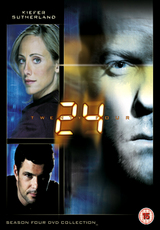 Aficionados will have no need of explanations, but for the unconverted and unaddicted, here’s some background.
Aficionados will have no need of explanations, but for the unconverted and unaddicted, here’s some background.
Keifer Sutherland stars as special agent Jack Bauer of CTU, a fictitious but highly plausible federal government agency dedicated to countering the threat of terrorism in America. Each series, of 24 episodes, covers 24 hours in Jack’s life in real time, beginning and ending at 7 a.m. CTU — the Counter-Terrorist Unit — is located in Los Angeles, where most of the action takes place, and the primary theme is that terrorists with "weapons of mass destruction" are threatening the lives of hundreds, thousands or even millions of Americans. They have to be stopped, at all costs, before they can release their deadly toxins/bombs/missiles/dirty nukes on an innocent and unsuspecting consumer populace.
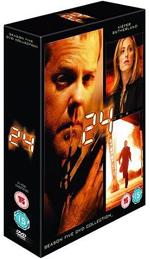 The prevailing atmosphere is one of perpetual anticipatory fear. Characters hardly ever sleep, eat, drink or perform any other of the bodily functions required to enjoy life. Survival — and the future itself — are wholly contingent on stopping the evil terrorists. Instant, all-pervasive surveillance technology is CTU’s principal weapon in this fight, apart from the more conventional stuff such as guns, needles, helicopters and fancy automobiles (24 is wholly sponsored by the Ford Motor Company). And Jack’s cellphone never dies.
The prevailing atmosphere is one of perpetual anticipatory fear. Characters hardly ever sleep, eat, drink or perform any other of the bodily functions required to enjoy life. Survival — and the future itself — are wholly contingent on stopping the evil terrorists. Instant, all-pervasive surveillance technology is CTU’s principal weapon in this fight, apart from the more conventional stuff such as guns, needles, helicopters and fancy automobiles (24 is wholly sponsored by the Ford Motor Company). And Jack’s cellphone never dies.
The show follows the actions of terrorists and conspirators as well as of Jack’s colleagues at CTU, and usually features a civilian family and a political figure such as a senator or president. This is significant in that it provides the writers and producers (Joel Surnow and Robert Cochran) opportunities to have a go at the pious, cloying sentimentality with which the political shibboleths of democracy, diversity and national security are invoked by hypocritical office-holders. Contemplating a rational course of action, one such office-holder might say, "This will destroy the American people’s faith in their government" or "This will tear the country apart."
The twist is that in this world of total information and constant surveillance, no-one is to be trusted. You never know who has employed or sponsored the terrorists, nor who — whether on the inside or on the outside — is on your side. Polarity — light and dark, good and bad — is the name of the game, but the wires sometimes get crossed, and you don’t know who’s pulling the strings. Yet, in Jack’s words, "You’re gonna have to trust me."
In the First Season (which aired from November 2001) the plot to assassinate black presidential candidate David Palmer is suspected to come "from inside the agency." As if to confirm the suspicion, the bringer of this news, an agency veteran, is assassinated — shot by an unidentified sniper right in front of Jack’s eyes. The agency itself is being watched by its enemies and by some of its own current and former members.
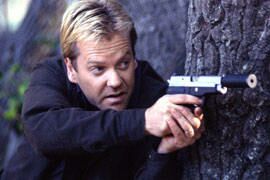 For the government men and women in sharp suits, Jack Bauer himself is a special danger, because he is "a loose canon," a maverick, a man who doesn’t play by the rules. Rivals (in love as well as in the bureaucratic hierarchy) deem him "out of control" and, echoing the venomous wish fulfillment which is characteristic of the show’s villains, let others know of their urgent conviction that he is "going down."
For the government men and women in sharp suits, Jack Bauer himself is a special danger, because he is "a loose canon," a maverick, a man who doesn’t play by the rules. Rivals (in love as well as in the bureaucratic hierarchy) deem him "out of control" and, echoing the venomous wish fulfillment which is characteristic of the show’s villains, let others know of their urgent conviction that he is "going down."
The terrorists, always bad by definition (and foreign, sometimes with a British accent), are also "going down." But like Jack, and for reasons of plot-making, they can never be allowed to do so. They keep popping up like a jack-in-a-box (pun intended), and again like Jack himself, are forever escaping from seemingly impossible situations.
These are the primary plot devices used to sustain the tension. With the end of each episode you are left on tenterhooks, wondering: how are you going to deal with this one, Jack?
That unresolved question is going to get you to watch the next episode — and accounts for the phenomenal success of 24 in its DVD format. This appears to offer the chance to satisfy your craving to know the outcome without having to wait for next week’s show. Jack, Houdini-like, usually extricates himself, and rides again. But since each episode builds to a new climax, with a different and even more impossible conundrum, true gratification is always postponed.
In addition to the clever, suspenseful pace of the show, and the effectiveness of its pyrotechnics, clearly a huge amount of research and creativity has gone into devising 24. So personally I think its success is thoroughly deserved. But what actually interests me is what it may be revealing about American society and the spirit of the times.
Paul Cantor wrote recently about the value of improvisation in television production, and how it contributes creatively to a spontaneous order in the cultural domain analogous to the Hayekian concept of spontaneous order in the economic sphere. This is the apparently chaotic, but perhaps most natural, arrangement of human affairs. In his article, he contrasted such rather rough-and-ready, improvised forms with the romantic or utopian idea of perfectly crafted order and the perfect artifact. With him, I believe that the effects and impact of popular culture, like TV shows, are often underestimated (and often entirely disregarded), because, being imperfect, often improvised, and defying categorization, they are not taken seriously.
An additional difficulty is that such popular artifacts may not be intelligently perceived at the time of their initial appearance. The reason for this is two-fold: first, the viewer has an up-close-and-personal involvement (and take it from me, this is a truly addictive show), which prevents him from establishing the necessary critical distance. Secondly, he or she is often too concerned with the linear narrative (what’s going to happen next) rather than with social, psychological and cultural effects (underlying cultural assumptions and themes).
This state of absorption in the entertainment leaves him or her open to a time-honored technique of television — its power to convey subliminal messages. Which messages you as a viewer see and absorb then depends in part on your preconceptions, in part on your openness to suggestion and how in-tune with the Zeitgeist you happen to be — in short, where you’re coming from. Thus:
-
In February 2003 Bill Sardi wondered whether Hollywood scripts like 24, which contain terrorist threats from foreign groups, were being used "to keep American citizens on edge," so that the terrorist threat could be kept alive in the minds of voters, President Bush’s approval ratings improved, and an excuse found for the then-upcoming invasion of Iraq.
-
In 2004 Karen Kwiatkowski saw Jack’s bending of the rules as an example of individual enterprise winning out over an ineffective state, whose heavy-footed functionaries use the time-honored excuse that they are "just following orders." This gave the show, in her view, a libertarian cast.
-
In 2006 a more jaded Dave Trotter, who no longer watches the whole of every episode as he used to, saw the protagonists’ willingness to use torture as a means, without any moral consideration of the ends to which it is being applied, as a subtle propaganda ploy to get the American public softened up for its future domestic use to enforce politically correct attitudes in the US under a potential "Clinton-analog presidency."
I can see all this and more, and that is part of the show’s fascination. 24 is an explosive cocktail of the war on terror at home (including all its hype), lethal privacy-invading technology, big money mainly in the form of ransom demands and pay-offs, and individual heroism alongside the power and corruption in government. All these evoke strong American traditions and ever-present popular concerns: time (the time is now, and we must make the most of it or die), corruption from within (holders of power are suspect and must be held in check), extortion, blackmail and justice (organized crime and how to deal with it), and fear of contamination from without (alien "others" have forever been coming to upset our demographics, but now they bring an extreme threat to life itself).
Richly overlaid on all this are two layers. The first is deception: nothing is what it seems. The assassin you see may actually have stolen someone else’s identity. This gives a whole new meaning to those perennial organizational precautions: watch your back and cover your ass.
 The second layer is nostalgia. LA in 24 is really a new Wild West, except that the corral and the gully have given way to the concrete and glass of office blocks and the parking garage, and gunmen fire from behind pillars and LCD screens rather than outcrops of desert rock. But blood is still spilt, and guns still smoke.
The second layer is nostalgia. LA in 24 is really a new Wild West, except that the corral and the gully have given way to the concrete and glass of office blocks and the parking garage, and gunmen fire from behind pillars and LCD screens rather than outcrops of desert rock. But blood is still spilt, and guns still smoke.
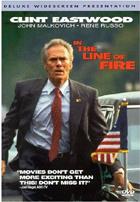 Whether consciously or not, 24 draws on a rich and authentically American film and TV legacy, including series like The High Chaparral (1967), and Fox’s own X-Files (1993), which both suggests and questions conspiracy behind government, as well as movies like Clint Eastwood’s 1976 The Outlaw Josey Wales (for the shootouts, and the tradition of the "honest outlaw" in the Western), and Alan J. Pakula’s 1976 All the President’s Men (for political intrigue). Mission Impossible (the TV series and the movies) is also in there (especially for its stolen identity theme), as is an earlier Jack, Harrison Ford’s agent Jack Ryan in the Philip Noyce films of Tom Clancy’s novels Patriot Games (1992) and Clear and Present Danger (1994). There’s also a debt to presidential assassination movies, like Executive Action (1973) and that other excellent Clint Eastwood film, In the Line of Fire (1993). And let’s not forget the dystopian, time-shifted vision of Terry Gilliam in Twelve Monkeys (1995), in which an unknown and lethal virus has wiped out five billion people on earth. Readers will, I am sure, be able to add more to this list.
Whether consciously or not, 24 draws on a rich and authentically American film and TV legacy, including series like The High Chaparral (1967), and Fox’s own X-Files (1993), which both suggests and questions conspiracy behind government, as well as movies like Clint Eastwood’s 1976 The Outlaw Josey Wales (for the shootouts, and the tradition of the "honest outlaw" in the Western), and Alan J. Pakula’s 1976 All the President’s Men (for political intrigue). Mission Impossible (the TV series and the movies) is also in there (especially for its stolen identity theme), as is an earlier Jack, Harrison Ford’s agent Jack Ryan in the Philip Noyce films of Tom Clancy’s novels Patriot Games (1992) and Clear and Present Danger (1994). There’s also a debt to presidential assassination movies, like Executive Action (1973) and that other excellent Clint Eastwood film, In the Line of Fire (1993). And let’s not forget the dystopian, time-shifted vision of Terry Gilliam in Twelve Monkeys (1995), in which an unknown and lethal virus has wiped out five billion people on earth. Readers will, I am sure, be able to add more to this list.
A favored device in 24 is the reference to the past, particularly the past personal life of the main characters. This "past tense" gives the show some historical depth and perspective, neatly compensating for the hectic speed of the "real time" in which it is filmed. For example, at the breakfast press conference given by David Palmer on the day of the California presidential primary in Season 1, Jack is accosted by an old flame from college days. She hints they she might be open to renewing her friendship with him. He gently puts her down with a reference to his daughter, which both lets her know that he has been married for some time and tells the audience that Jack is a good family man who doesn’t dally with past acquaintance.
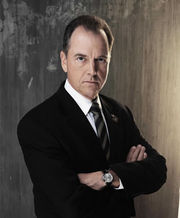 24 also has a nice take on the bureaucratic infighting at the heart of government. In Season 5, the agency is compromised and infiltrated, and is itself the victim of a terrorist attack, but still the ultimate threat is none of these — it is the takeover of the agency by another government department, Homeland Security, which has been called in in light of CTU’s manifest inability to defend even itself. Thus, as always, the government solution to government incompetence is to bring in even bigger government.
24 also has a nice take on the bureaucratic infighting at the heart of government. In Season 5, the agency is compromised and infiltrated, and is itself the victim of a terrorist attack, but still the ultimate threat is none of these — it is the takeover of the agency by another government department, Homeland Security, which has been called in in light of CTU’s manifest inability to defend even itself. Thus, as always, the government solution to government incompetence is to bring in even bigger government.
The Fifth Season also brought the theme of rottenness at the heart of the executive to its high point. The corrupt, conspiratorial US president in this series, Charles Logan (played by Gregory Itzin), who in the final episode is unceremoniously escorted away (presumably into custody) by secret service men, not only has a disyllabic surname, which evokes Nixon, but is also made to look like him. It’s Watergate all over again.
Is 24 a libertarian show? Sometimes I would like to think so. At one crisis point, someone suggests that a particular action or strategy, if pursued, "will damage the integrity of our government." Jack Bauer, quick as a flash, responds: "Our government has no integrity." Hope lights up, only to be dashed down when he adds, "while the current president in still in office." In other words, get a good man into the presidency, and all will be well again with America.
 Maybe this is nostalgic wish for another Watergate, but Watergate has been and gone, yet big government today is bigger than it ever has been. 24 does not question the supposed virtues of democratically-elected big government itself, and Jack the maverick is in the end its finest exemplar. I can even hear the calls, "Jack Bauer for President."
Maybe this is nostalgic wish for another Watergate, but Watergate has been and gone, yet big government today is bigger than it ever has been. 24 does not question the supposed virtues of democratically-elected big government itself, and Jack the maverick is in the end its finest exemplar. I can even hear the calls, "Jack Bauer for President."
If I had to label the show’s politics I would say it is really small c conservative. There’s a strong focus on the solidity and reliability of the family, for example. This conservatism is overlaid with a hefty dose of plausible conspiracy theory (President Logan at one point gives a direct order for a plane full of passengers to be shot down), which in turn reflects the panic and narcosis culture of the cultivated, but unreal, post-9/11 state of permanent emergency.
The main reason for concluding that the show is not really concerned with enlarging the sphere of liberty is its attitude to ends and means. No clearer message emerges from every episode than that the ends justify the means. Torture is portrayed as an acceptable technique for extracting information and forcing confessions — even from the innocent or those not yet proven guilty. Significantly, CTU uses medical torture on its own employees when these are suspected of treason.
 Jack’s unorthodox measures, including random and widespread killing, are also not questioned on moral grounds — they justify themselves because they are shown to be effective in a "real-world situation" where there is no time to consider the issues. This is expediency, which in turn breeds a kind of ferocious blood-lust for its own sake: at a key moment in Season 5, when Jack and his girlfriend and fellow-CTU worker Audrey Raines have hunted down and trapped a traitorous former CTU chief, she exhorts him with the words, "Kill him, Jack, Kill him!" — and you can be sure the audience is right behind her.
Jack’s unorthodox measures, including random and widespread killing, are also not questioned on moral grounds — they justify themselves because they are shown to be effective in a "real-world situation" where there is no time to consider the issues. This is expediency, which in turn breeds a kind of ferocious blood-lust for its own sake: at a key moment in Season 5, when Jack and his girlfriend and fellow-CTU worker Audrey Raines have hunted down and trapped a traitorous former CTU chief, she exhorts him with the words, "Kill him, Jack, Kill him!" — and you can be sure the audience is right behind her.
Finally, the easy assumption of the pervasiveness and reach of the mechanisms of surveillance and invasion of privacy by all the characters has to be deeply troubling to those concerned with the restoration of civil liberty, and there is no suggestion that these mechanisms will ever be reversed. In fact, they are the mainstay of the show, as they are perhaps of any government seeking "total information awareness" — but to what end?
This is dangerous stuff, and if nothing else points to an uneasy emptiness ahead: we are on the road, but we don’t know where we’re going.
But don’t let that spoil your enjoyment of the show — for now. "You’re gonna have to trust me on this."



